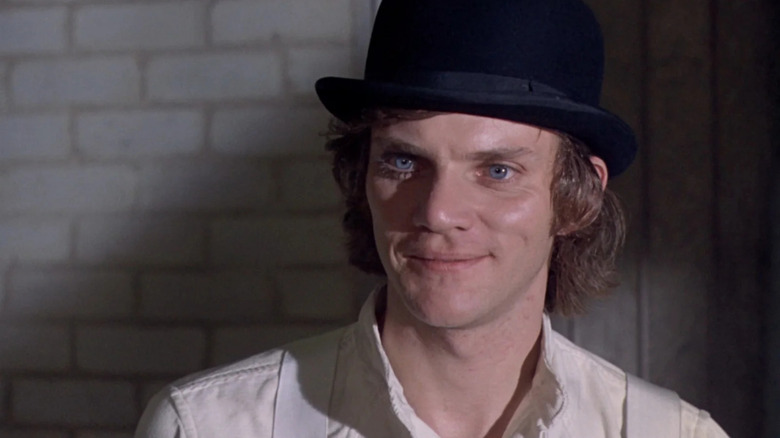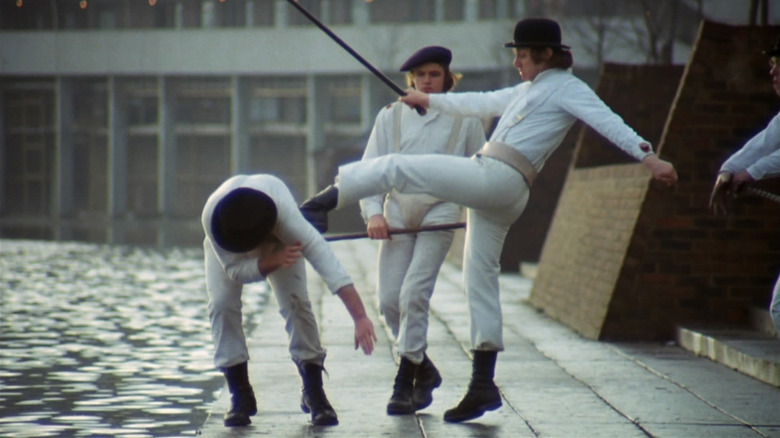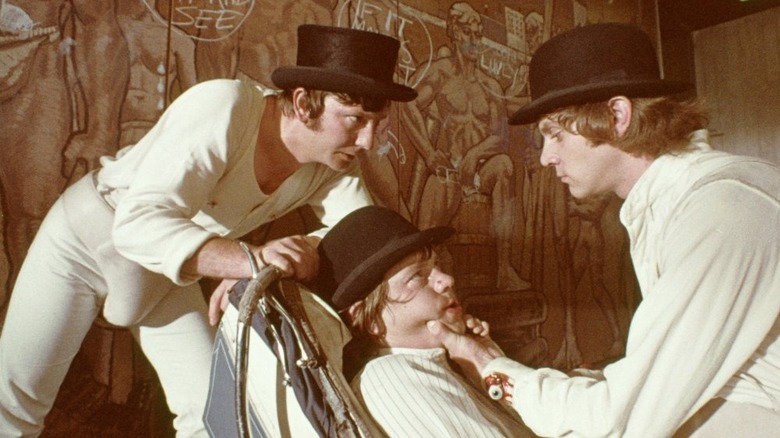A Clockwork Orange's Malcolm McDowell Thinks Many Misunderstood The Classic Film
Most discussions of Stanley Kubrick's 1971 sci-fi satire "A Clockwork Orange" eventually allude to the film's copious violence. The film's protagonist, Alex DeLarge (Malcolm McDowell) is an amoral 15-year-old delinquent who sees the world as the kindling to ignite the furnace of his drug-laced, sex-crazed, bloodthirsty appetites. He spends his days skipping school, and his nights leading his street gang, the Droogs, into various brutal misadventures. The Droogs pummel other gangs, beat up homeless people for no reason, and even invade people's homes to commit sexual assault.
For Alex, there is nothing else in the world besides his capacity to destroy it. When he listens to his favorite piece of music — Beethoven's Ninth Symphony — his mind disappears into a pit of depravity. He imagines himself as a gleeful vampire. Later in the film, when he reads the New Testament, he can most closely relate to the Roman soldiers whipping Christ.
Some critics have said that Kubrick seemingly advocates the violence in "A Clockwork Orange," as Alex is presented as bright, funny, and charismatic. He is having the time of his life. McDowell's performance is daring and painful, playing Alex as a smirking child with fathomless contempt hidden deep in his sparkling eyes. Alex is no hero, but one might see his appeal as a cinematic construct.
Other critics have felt that "A Clockwork Orange" is a tragedy, a brutal, difficult film full of violence we are meant to shrink from. Here is a lad without morals, and we are to witness the depths of his depravity. McDowell himself feels that both those interpretations of Kubrick's film are slightly incorrect. In a 2021 interview with ScreenRant, McDowell pointed out that "A Clockwork Orange" is indeed violent, but that it's an unreal, satirical violence. The film should be laughed at more.
McDowell was shocked by audience's reactions
McDowell said he was a little shocked to learn that so many audiences only responded to the violence in "A Clockwork Orange" when it was first released. Yes, it has many scenes of assault, but he felt the violence was so unbearably over-the-top that it would be hard for audiences to take it seriously. Surprisingly, they did. McDowell said:
"Well, of course, I was thrilled when it came out. People have recognized it. I was a bit perturbed that they seemed to think it was a very violent film. And I honestly thought they missed the point there, because it's really satirical, that part. I mean, yes, it's violent, more violence, it's psychological violence, which is, of course, harder to take. But it's certainly not violent like a Sam Peckinpah movie. I mean, that, that's real violence all in slow motion and exploding bodies and all the rest of it. But even that, to me, was like a ballet."
McDowell's viewpoint goes to a longstanding contemporary argument about depiction vs. advocacy. If a filmmaker chooses to put an act of violence in their film, some feel that it counts as an implicit approval. Others more wisely point out that a film's attitude and context provide the true viewpoint on its violence. McDowell sees the violence in "A Clockwork Orange" as wholly artificial and presented in a so wild a context that one could watch it without being disturbed. Indeed, on a certain level, "A Clockwork Orange" might be seen as a particularly aggressive slapstick comedy. Just one that happens to be about moral depravity.
Alex out of context
McDowell was also reminded, in a very brusque fashion, that movie villains, when they become popular enough, merely turn into fashion icons. Think of how whimsically Darth Vader is treated across popular culture. One can buy little cuddle Darth Vader plushies at Disneyland, happily ignoring that he murdered children and, later in his life, used the Death Star to murder millions of people. He's a supervillain used to sell butter and fruit drinks. It seems that Alex DeLarge would have been similarly marketed if McDowell had not refused. McDowell is a professional actor and not a pitchman. He recalls the offer, saying:
"I remember turning down $1 million — in those days, that was a lot of money — to go to Japan to do an advertisement for milk. Now, when they said it, I went, 'Yeah. So how much? Oh my God. Yes.' But then they said, 'Yeah, but you've got to wear the eyelash, the bowler,' and I went, 'No. No, I can't do that. I mean, I'm happy to do it as me, but I'm not doing it as that character.' And I had to forego that, which was tough. In those days, it was a staggering amount of money."
One can admire McDowell for his refusal to sell out. One might also wonder why a Japanese milk company would want Alex DeLarge associated with their product. In "A Clockwork Orange," Alex drinks milk, but it's laced with drugs that make him pumped up to commit ultraviolence. Then he assaults people brazenly. Even in a satirical context, or even with a fistful of irony, that seems pretty unwise.
The milk company, instead went with Ash from the movie "Alien." (I'm joking.)


